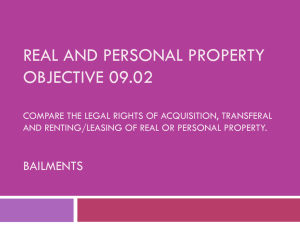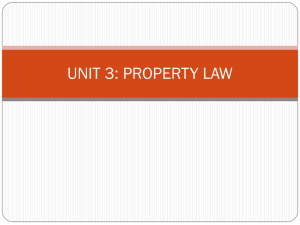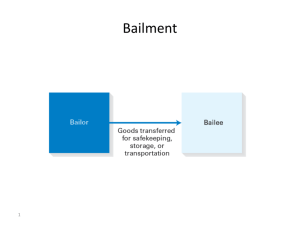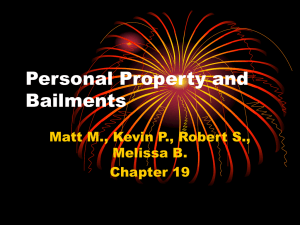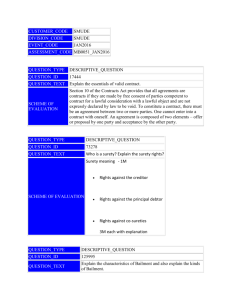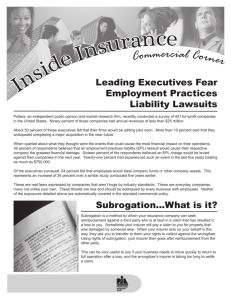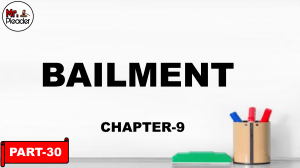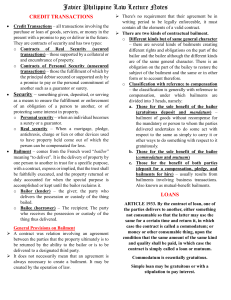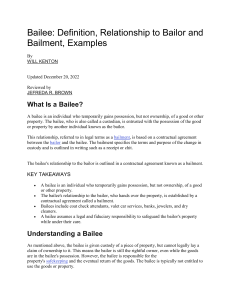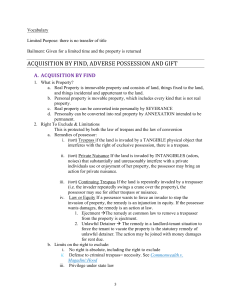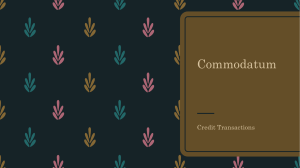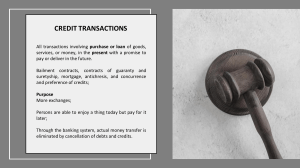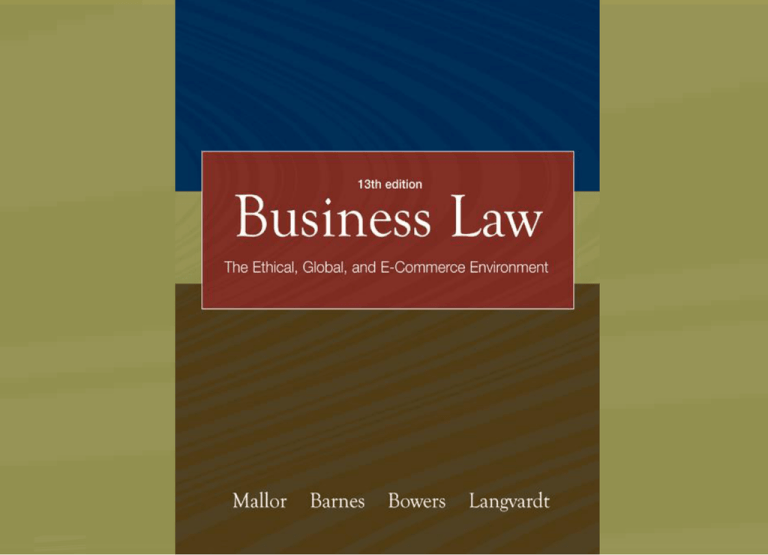
P A R T
5
Property
Personal Property and Bailments
Real Property
Landlord and Tenant
Estates and Trusts
Insurance Law
McGraw-Hill/Irwin Business Law, 13/e
© 2007 The McGraw-Hill Companies, Inc. All rights reserved.
C H A P T E R
23
Personal Property and Bailments
“Few rich men own their
own property. The
property owns them.”
Robert Green Ingersoll, in an address
to the McKinley League, New York
City (October 29, 1896)
Learning Objectives
Nature
& classifications of personal
property
Acquiring ownership of personal
property
Bailments
Documents of title
23 - 4
Property Overview
Property refers to (a) something that may be
owned, or (b) a right or interest that allows a
person to exercise dominion over a thing that
may be owned or possessed
American principles of private property
developed out of Western civilization
Other cultures may have different principles
Property is classified as real or personal
23 - 5
Classifying Property
Personal property may be classified as:
Tangible – has a physical existence
Examples:
furniture
cars, clothing, animals,
Intangible -- has no physical existence
Examples:
intellectual property (patents,
copyright, trademark), stocks, and bonds
23 - 6
Acquiring Ownership
Ownership of personal
property may be acquired
by: production, purchase,
lease, taking possession of
unowned property, will
or inheritance, confusion,
accession, or gift
23 - 7
Possession of Unowned Property
First
person to take possession of a wild
animal normally becomes owner of animal
Finder of abandoned property may claim
ownership
Finder of lost property does not acquire
ownership, but acquires better rights than
anyone other than the true owner
Finder of mislaid property acquires no rights,
but has right to hold property for true owner
23 - 8
Acquisition of Property
Confusion
is ownership due to intermixing of
different owners’ goods
Accession means increasing property value by
adding materials, labor, or both
Inheritance refers to transfer of property upon
the death of former owner
Gift is a voluntary transfer of property to a
donee (recipient) from a donor (gift giver) who
receives no consideration in return
23 - 9
Bailments
A
bailment occurs when a bailor who owns
personal property (or someone holding the
right to possess it) delivers it to another (the
bailee) who accepts it and is under an express
or implied agreement to return it to the bailor
or to someone designated by the bailor
Example: bailment of
car to valet
23 - 10
Duties & Rights of The Bailee
Bailee
has two basic duties: (1) take care of
property and (2) return it to owner
Degree of care required of bailee to protect
property depends on the type of bailment:
For bailor (slight degree of care)
Mutual benefit (ordinary care)
For bailee (high degree of care)
Professional
23 - 11
bailees held to higher standard
Documents of Title
A document of title refers to the document
that identifies ownership of property
Warehouse receipt or bill of lading may be
either negotiable or non-negotiable
23 - 12
Person who acquires negotiable document of
title generally acquires both title to the
document and goods
Test Your Knowledge
True=A, False = B
A person who finds abandoned property may
claim ownership
A conditional gift is not a gift.
Tom found a textbook on a desk that had “S.
James” written inside the cover. Tom has the
right to sell the textbook.
Personal property may be classified as
tangible or intangible.
23 - 13
Test Your Knowledge
True=A, False = B
23 - 14
A document of title refers to the document
that identifies ownership of property.
A shipping company, such as UPS, is held
only to a slight duty of care.
A bailment is a contract.
Accession means mixing property owned by
several people so that the property cannot be
separated and ownership is indeterminate.
Test Your Knowledge
Multiple Choice
Jake borrowed Jane’s car, but dented the
rear fender. Jake must:
(a) Say he’s sorry, but with only a slight duty
of care, he owes no further obligation to Jane
(b) Return the car to Jane in the same or similar
condition or pay damages
(c) Replace the car
(d) both B and C
(e) none of the above
23 - 15
Test Your Knowledge
Multiple Choice
Ben gave Jenn an engagement ring, but
Jenn decided to break the engagement.
Ben asked for the return of the ring. Which
of the following is correct?
(a) Jenn may keep the ring since it was a gift
(b) Jenn may sell the ring and keep the money
(c) Jenn must return the ring to Ben
(d) Both A and B are possible options
(e) none of the above
23 - 16
Thought Questions
Have you ever been a bailee? A bailor?
What type of problems may arise in a
bailment situation?
23 - 17

